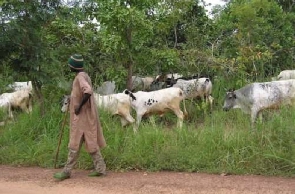Amadu Alhassan, a 53-year-old District Best Farmer in Upper Manya Krobo, Eastern Region, is calling on the government to address the Fulani menace in the district, citing concerns about its impact on food security.
Alhassan emphasized that the destructive activities of Fulani herdsmen and their cattle continue to pose threats to farming in the area.
He alleged the herdsmen also abuse women farmers they come across on farms with impunity.
“We are struggling to farm. We are suffering because of cows disturbing and destroying our farms. The Fulani people if they come to catch your wife in the bush, then you no get a wife again, they will rape her. So the government should stop them for us to farm,” Alhassan complained to Starr News.
In addition to the Fulani menace, Alhassan lamented the lack of essential agricultural machinery, notably tractors, hindering farmers from engaging in commercial farming effectively.
“Secondly, we don’t have a tractor. We are bringing a tractor from outside the district. The price they charge is too high. We can’t farm so we need a tractor. And the weedicide too the price is so high for us so we are suffering so we beg the government to help us,” he said.
Speaking at the 39th Farmers Day celebration, the District Chief Executive (DCE) for Upper Manya Krobo, Joe Sam, acknowledged the challenges faced by farmers.
He urged farmers to exercise restraint regarding the deteriorating road conditions in the district, which currently lacks any tarred roads.
Despite being a significant food-producing area, the district grapples with deplorable roads, impacting the transportation of farm produce to market centers.
The DCE assured the public that road reshaping works, temporarily halted due to the rainy season, would resume soon to ease transportation challenges.
“Deplorable state of most of our roads in the district is an issue of grave concern as it has a direct impact on movement and agriculture activities. For the months past, the assembly had to halt reshaping works as a result of the rainy season which hampered the progress of work.
However “I want to assure the members of the general public that reshaping works will start very soon in various communities to facilitate carting of farm produce and bring the needed respite to our people. I wish to therefore implore all of you to exercise restraint,” the DCE said.
Joe Sam outlined various challenges faced by local farmers, including the land tenure system, limited access to markets and credit, the severe impact of climate change, post-harvest losses, high input costs, and low return on investment.
He expressed optimism about the positive impact of the Planting for Food and Jobs policy, expecting the second phase to bring further relief to local farmers.
Speaking on the theme “Delivering Smart Solutions for Sustainable Food Security and Resilience,” the District Director of Agriculture Debrah Appiah-Agyekum said efforts are underway to build the capacity of staff and farmers on climate-smart agricultural practices.
He said through the planting for export and rural development, thousands of oil palm and coconut seedlings have been distributed to farmers to meet the growing demand for the commodity.
He said the department together with its partners began a massive bushfire prevention campaign to mitigate annual bushfire incidents during the dry season to prevent destruction of farms.
Regional News of Monday, 4 December 2023
Source: starrfm.com.gh

















